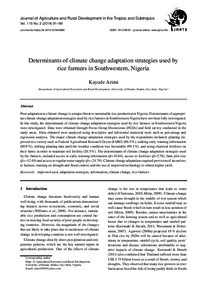Datum
2014Autor
Arimi, KayodeSchlagwort
630 Landwirtschaft, VeterinärmedizinMetadata
Zur Langanzeige
Aufsatz

Determinants of climate change adaptation strategies used by rice farmers in Southwestern, Nigeria
Zusammenfassung
Poor adaptation to climate change is a major threat to sustainable rice production in Nigeria. Determinants of appropriate climate-change adaptation strategies used by rice farmers in Southwestern Nigeria have not been fully investigated. In this study, the determinants of climate change adaptation strategies used by rice farmers in Southwestern Nigeria were investigated. Data were obtained through Focus Group Discussions (FGDs) and field survey conducted in the study areas. Data obtained were analyzed using descriptive and inferential statistical tools such as percentage and regression analysis. The major climate change adaptation strategies used by the respondents included; planting improved rice variety such as Federal Agricultural Research Oryza (FARO) (80.5 %), seeking early warning information (80.9 %), shifting planting date until the weather condition was favourable (99.1 %), and using chemical fertilizer on their farms in order to maintain soil fertility (20.5 %). The determinants of climate change adaptation strategies used by the farmers, included access to early warning information (β=43.04), access to fertilizer (β=5.78), farm plot size (β=–12.04) and access to regular water supply (β=–24.79). Climate change adaptation required provision of incentives to farmers, training on drought and flood control, and the use of improved technology to obtain higher yield.
Zitierform
In: Journal of Agriculture and Rural Development in the Tropics and Subtropics. Kassel : Kassel University Press. - Vol. 115, No. 2 (2014), S. 91-99Sammlung(en)
Vol 115, No 2 (2014) (Journal of Agriculture and Rural Development in the Tropics and Subtropics (JARTS))Zitieren
@article{urn:nbn:de:hebis:34-2014121946886,
author={Arimi, Kayode},
title={Determinants of climate change adaptation strategies used by rice farmers in Southwestern, Nigeria},
year={2014}
}
0500 Oax 0501 Text $btxt$2rdacontent 0502 Computermedien $bc$2rdacarrier 1100 2014$n2014 1500 1/eng 2050 ##0##urn:nbn:de:hebis:34-2014121946886 3000 Arimi, Kayode 4000 Determinants of climate change adaptation strategies used by rice farmers in Southwestern, Nigeria / Arimi, Kayode 4030 4060 Online-Ressource 4085 ##0##=u http://nbn-resolving.de/urn:nbn:de:hebis:34-2014121946886=x R 4204 \$dAufsatz 4170 7136 ##0##urn:nbn:de:hebis:34-2014121946886
<resource xsi:schemaLocation="http://datacite.org/schema/kernel-2.2 http://schema.datacite.org/meta/kernel-2.2/metadata.xsd"> 2015-01-13T14:51:02Z 2015-01-13T14:51:02Z 2014 1612-9830 urn:nbn:de:hebis:34-2014121946886 http://hdl.handle.net/123456789/2014121946886 eng Kassel University Press Urheberrechtlich geschützt https://rightsstatements.org/page/InC/1.0/ improved seed adaptation strategies information climate change rice-farmers 630 Determinants of climate change adaptation strategies used by rice farmers in Southwestern, Nigeria Aufsatz Poor adaptation to climate change is a major threat to sustainable rice production in Nigeria. Determinants of appropriate climate-change adaptation strategies used by rice farmers in Southwestern Nigeria have not been fully investigated. In this study, the determinants of climate change adaptation strategies used by rice farmers in Southwestern Nigeria were investigated. Data were obtained through Focus Group Discussions (FGDs) and field survey conducted in the study areas. Data obtained were analyzed using descriptive and inferential statistical tools such as percentage and regression analysis. The major climate change adaptation strategies used by the respondents included; planting improved rice variety such as Federal Agricultural Research Oryza (FARO) (80.5 %), seeking early warning information (80.9 %), shifting planting date until the weather condition was favourable (99.1 %), and using chemical fertilizer on their farms in order to maintain soil fertility (20.5 %). The determinants of climate change adaptation strategies used by the farmers, included access to early warning information (β=43.04), access to fertilizer (β=5.78), farm plot size (β=–12.04) and access to regular water supply (β=–24.79). Climate change adaptation required provision of incentives to farmers, training on drought and flood control, and the use of improved technology to obtain higher yield. open access In: Journal of Agriculture and Rural Development in the Tropics and Subtropics. Kassel : Kassel University Press. - Vol. 115, No. 2 (2014), S. 91-99 Arimi, Kayode Gedruckte Ausg. im Verlag Kassel Univ. Press (www.upress.uni-kassel.de) erschienen. </resource>
Die folgenden Lizenzbestimmungen sind mit dieser Ressource verbunden:
Urheberrechtlich geschützt

